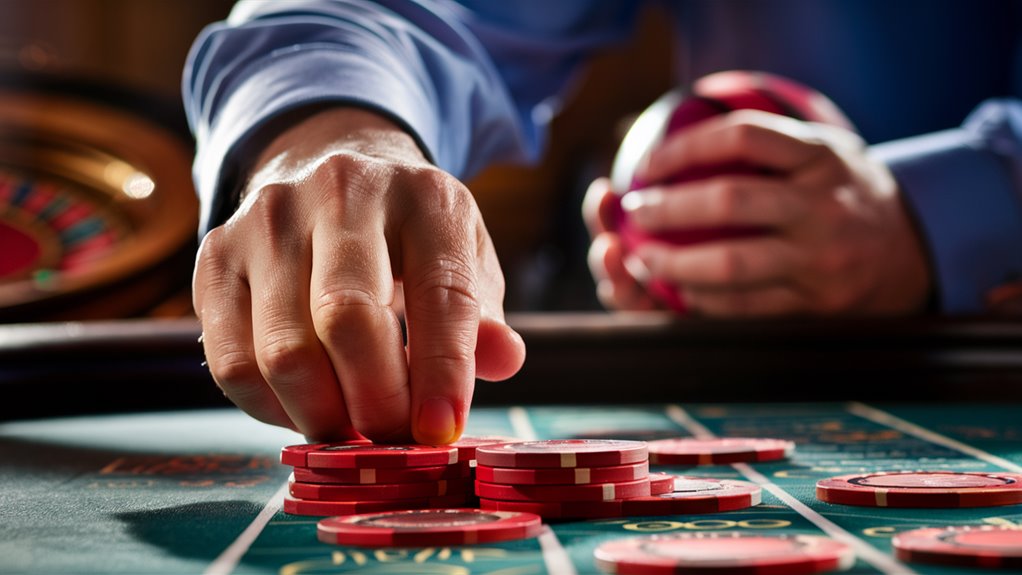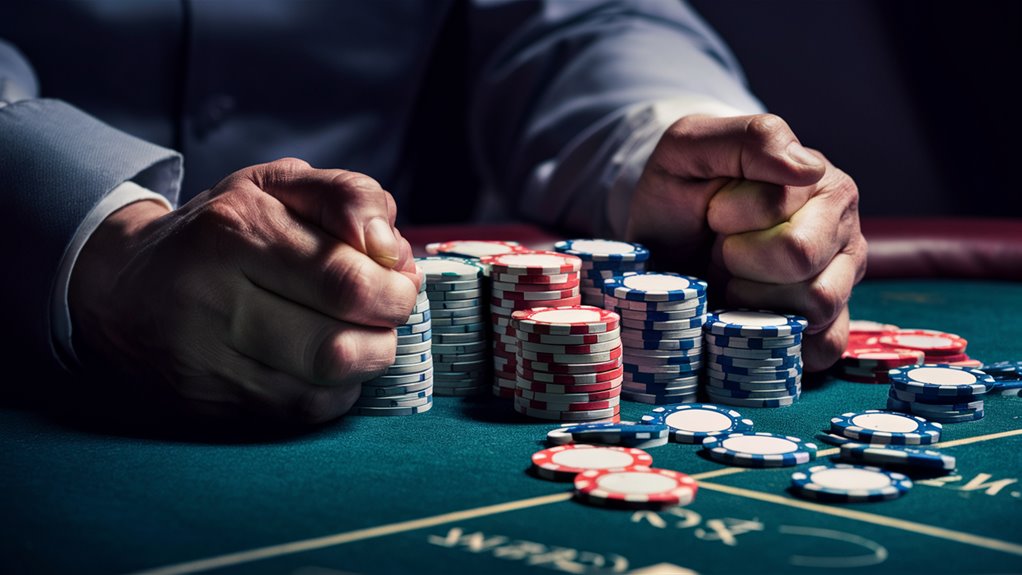
How to Keep Feelings in Check When Gambling

Keeping emotions in check when gambling requires a plan focusing on three key aspects: planning, watching, and setting limits.
Plan and Get Ready
Before starting any gambling, set strict money limits and learn calming methods such as deep breathing and muscle relaxation. Create a list before gambling indicating your spending limit, time limits, and feelings.
Watch Closely
Monitor your feelings using a 1-10 scale during gambling. Look for clues of becoming worked up:
- Faster heartbeat
- Tense muscles
- Sweating
- Quick breaths
- Racing thoughts
Set and Keep Limits
Make break times mandatory when feeling pressured or tempted to recover losses. Maintain a detailed gambling log noting:
- Betting actions
- Feelings
- Wins and losses
- Location
- Time management
Learn More Ways to Stay Calm
- Try gambling-specific mindfulness
- Use rewards or penalties for adherence to plans
- Challenge negative gambling thoughts
- Build a support system
- Have a strategy for tense moments
Combine emotional awareness with strict money control for smart gambling.
Know Why We Bet
The Science Behind Why We Bet
How It Affects Our Brains
Betting triggers significant emotions deep within our brain’s reward center.
This is not by chance but involves brain processes influencing decisions during bets.
The mix of risk assessment and emotion management forms a complex mental strategy shaping gambling behavior.
Dopamine and Choices
Dopamine, a crucial neural signal, plays a key role in gambling psychology.
It surges during bets, especially when winning, providing a feel-good rush affecting betting decisions.
During intense emotional highs, particularly in ‘wild choice‘ situations, judgment may be impaired, leading to poor decisions.
Common Mind Traps in Betting
The Bettor’s Mistake
Cognitive illusions significantly affect betting decisions. Dipping Into Dark Pools for Hidden Upside
The bettor’s fallacy is a common trap where gamblers wrongly assume past events influence future outcomes.
This misperception leads to poor betting choices.
Selective Memory and Win Recall
Selective memory plays a crucial role in gambling, with individuals better recalling wins than losses.
This cognitive bias distorts perceived win rates, potentially encouraging continued play despite increasing losses.
Keep a Handle on Feelings
Understanding these cognitive aspects prepares us to develop effective emotion management strategies.
Stick to Money Rules
Set Hard Cash Limits for Smart Gambling
Kick-Off Limits
Firm financial discipline is crucial for responsible gambling behavior.
Like a locked safe protecting valuables, hard cash limits provide a framework for controlled gambling enjoyment.
These boundaries help preserve financial security while engaging in gambling.
Implementing a Three-Level Limit Plan
Daily Game Caps
Daily betting limits provide initial protection. Set a strict limit for each gambling session and adhere to it consistently, establishing a firm stopping point for each play session.
Weekly Caps
Weekly spending rules ensure gambling habits remain manageable over multiple sessions. Monitor these limits diligently to maintain a close watch over gambling expenses.
Monthly Checks
Monthly spending caps offer the broadest financial perspective, integrating gambling into an overall financial plan. This level acts as a final safety net against overspending.
How to Implement This
Reserve gambling funds exclusively in:
- Specific payment cards
- Secure online wallets
- Dedicated bank accounts
Stick to the Rules
Fixed boundaries are the core of responsible gambling strategies.
Research indicates that gamblers viewing limits as firm boundaries, not flexible suggestions, maintain better control over their behavior.
Upon reaching a set limit, cease immediately – avoid exceeding it. Transmuting Light Strokes Into Flashes of Jackpot
Stay Sharp When Betting
Maintaining Clarity While Gambling

Stay Aware While Gambling
Disciplined gambling habits complement financial limits, enabling gamblers to make rational decisions over emotional ones.
Practicing mindfulness techniques during gambling sessions helps maintain control and reduces impulsive decisions.
Essential Mindfulness Techniques
Controlled Breathing and Body Awareness
Deep breaths before gambling activate the calming part of the nervous system, reducing impulsivity.
Monitor bodily signals like muscle tension, sweat, or rapid heartbeat, as these indicators often precede emotional gambling decisions.
Emotion Monitoring
Identify emotions as they arise to make better gambling choices. Recognize and label emotions without judgment, creating a necessary gap between feelings and gambling actions.
Utilize a 1-10 emotional scale to track emotional changes throughout your gambling session.
Recognize Stop Signals
Key indicators to pause gambling include:
- Chasing losses
- Exceeding set betting limits
- Experiencing significant mood swings
- Struggling to concentrate
Long-Term Mindfulness Practices
Regular meditation sessions improve emotional awareness and decision-making during gambling sessions.
Daily 5-10 minute sessions build mental resilience useful in gambling, helping keep emotions in check.
Strategic Mindfulness Moves
Incorporate thoughtful decision-making steps before placing significant bets: Cloaking Bold Bluffs in Wispy, Low-Key Maneuvers
- Pause to assess your breathing
- Examine current emotional state
- Consider whether the bet aligns with your strategic plan
- Ensure adherence to established limits
Common Emotional Triggers in Gambling
Emotional Triggers in Gambling
Major Emotional Triggers in Gambling
Emotional influences shape gambling decisions and actions.
Recognizing them aids in maintaining composure and preventing problematic gambling behavior.
Loss-Related Triggers
Pursuing lost money is a significant emotional trigger in gambling. When players experience losses, the urge to regain losses can lead to:
- More aggressive betting
- Disregarding set money rules
- Poor decision-making under stress
- Engaging in riskier bets
Win-Related Triggers
Winning streaks elicit strong emotions that can distort judgment:
- Overconfidence in gambling abilities
- Unwarranted assurance in betting decisions
- Belief in continued success
- Increased betting amounts and risk-taking
Environmental and Personal Triggers
Emotional Stressors
Internal emotional states play a significant role in gambling behavior:
- Anxiety and depression
- Financial worries
- Work-related stress
- Family issues
Social Influences
External pressures from surroundings can trigger problematic gambling:
- Peer pressure
- Casino environment
- Online gambling community influence
- Desire to impress others
Everyday Stressors
Daily occurrences can trigger gambling urges:
- Boredom or loneliness
- Lack of alternate activities
- Alcohol consumption
- Insufficient sleep
- Financial fluctuations
Handle Emotional Triggers
Recognizing these triggers facilitates the establishment of effective control strategies:
- Set clear gambling limits
- Monitor emotional changes
- Build a supportive network
- Develop alternative coping mechanisms 먹튀검증업체 순위
- Seek professional assistance when needed
Bounce Back After Losses
Recovering from Gambling Losses: A Comprehensive Guide
Understanding the Impact of Losses
Gambling losses can cause emotional distress and financial disruption, necessitating a structured recovery plan.
Adopting proven strategies aids in emotional and financial rehabilitation.
Immediately Following a Loss
Manage Emotions
Practicing self-compassion is crucial after incurring losses. Separate self-worth from financial outcomes through mindfulness exercises such as meditation and deep breathing.
These techniques help regulate emotions and promote mental clarity.
Formulate a Recovery Plan
Take a cooling-off period before making financial decisions. Document emotional experiences and review gambling actions to identify the underlying causes.
This approach prevents impulsive decisions and highlights areas for improvement.
Long-Term Strategies
Establish a Support Network
Engage with trusted family, friends, and professionals.
Research indicates that consistent support from a network aids recovery and emotional stability.
Seek Professional Guidance
Contact gambling helplines for immediate support and access to specialized resources.
Working with a professional provides structured assistance through established recovery programs, addressing both psychological and financial aspects.
Revise Financial Health
Create a comprehensive financial plan encompassing:
- Assessing and managing debts
- Revising budgeting practices
- Setting clear financial objectives
- Implementing safeguards against future losses
Prevent Recurrence
Implement safeguards including:
- Regular self-assessments
- Close financial monitoring
- Identifying gambling triggers
- Continuous participation in support groups
- Learning stress management techniques
These comprehensive measures establish a solid foundation for staying on track and preventing further gambling setbacks.
Develop Resilient Betting Habits
Develop Strong Mental Habits for Smart Gambling
Establish Core Mental Practices
Effective mental practices underpin responsible gambling behavior.
Building them requires consistent engagement in proven psychological techniques and strict adherence to established limits.
Successful gamblers maintain emotional regulation through strategic, evidence-based methods.
Key Mental Control Strategies
Set Firm Rules
Establish clear guidelines for all gambling activities.
Implement time constraints, loss limits, and win targets before gambling commences.
When faced with pressure to exceed these limits, employ deep breathing exercises – a scientifically supported method to mitigate impulsive actions.
Meditation and Mindfulness Exercises
Consistent meditation practices, particularly 10 minutes daily, enhance mental control and emotional stability during gambling.
This mental conditioning improves decision-making and promotes clear thinking under stress.
Monitor Emotional States Closely
Track Emotional Patterns
Maintain a detailed gambling journal to document emotional states and corresponding actions.
Record emotions, triggers, and outcomes to cultivate deep self-awareness.
This surveillance helps identify emotional triggers and habitual behaviors.
Balance Emotions and Rationality
Effective mental habits involve processing emotions while maintaining rational thought.
Through continual use of these validated techniques, individuals develop the mental fortitude required for smart gambling.




